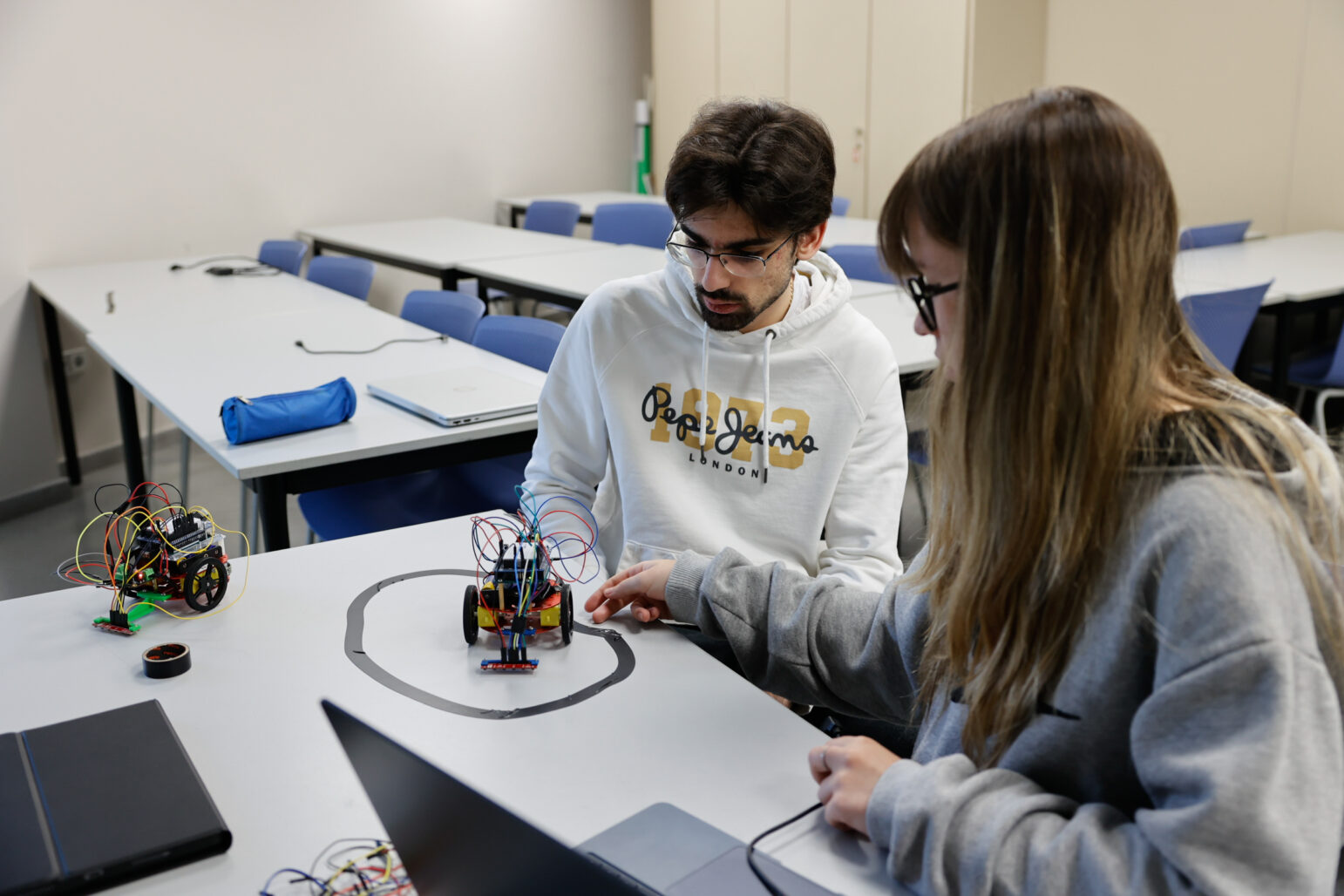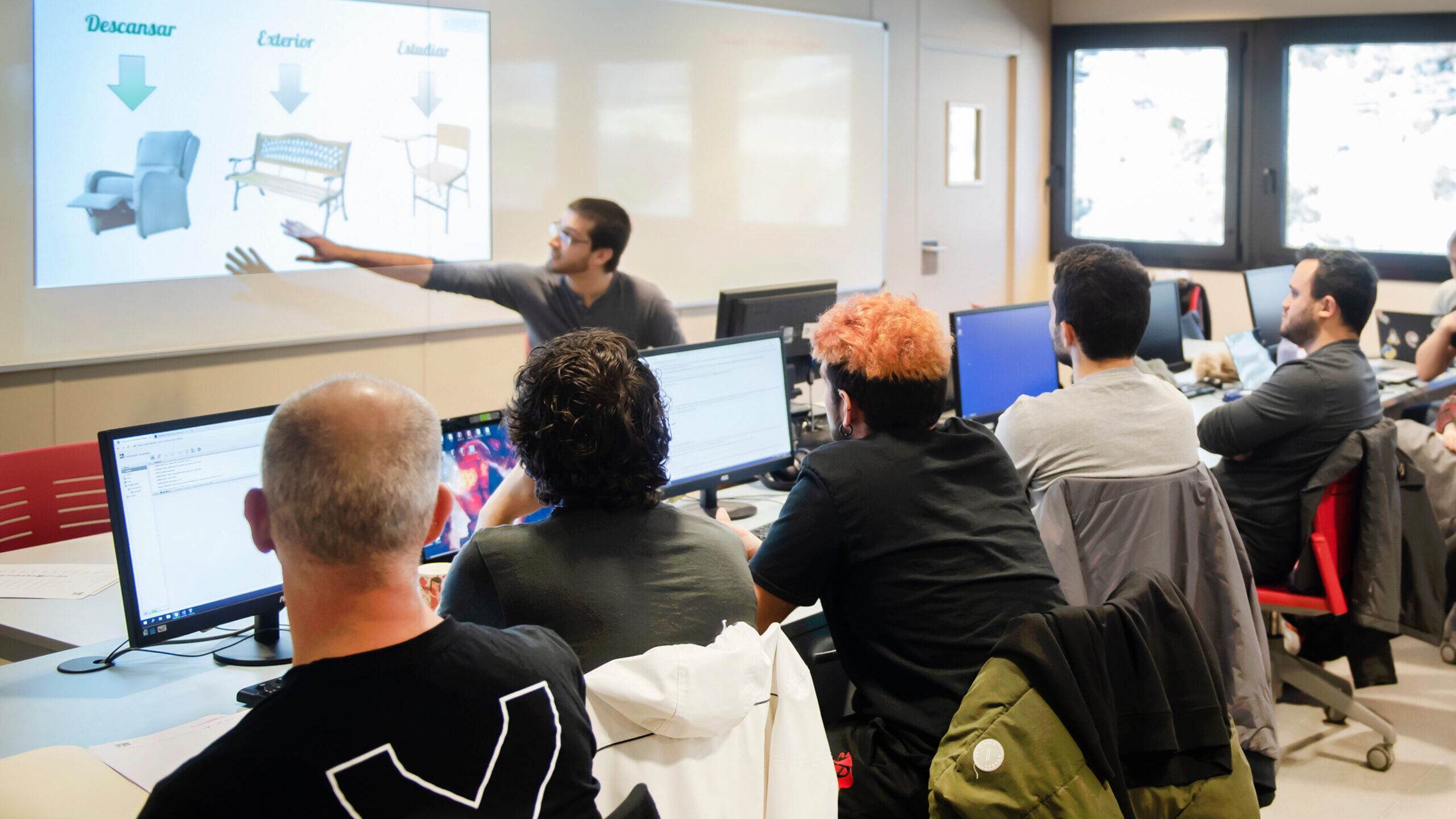Bachelor of Computer Science
The Bachelor of Computer Science forms versatile professionals and provides them with a solid base of knowledge and skills to properly carry out diverse activities in the information and communication technologies field.
The training provides a range of competences related to programming and application development, computer architecture, networks and computer security, robotics, data analysis and video game design and programming. It also offers knowledge necessary for other competences related to communication and business organisation and management. Additionally, in order to strengthen language skills, some modules are taught in English.
The Bachelor of Computer Science is evaluated and accredited by the AQUA (Andorran Agency for the Quality of Higher Education), which ensures its quality and European recognition. Students who pass these courses can obtain a Bachelor of Computer Science, a state qualification issued by the Andorran Government.
Distinctive Features
It can be studied in on-campus, online or blended format, allowing the students to combine their studies with other professional activities. Continuous assessment tests and final exams are always conducted in person, regardless of the chosen mode of study. Further information
The Bachelor of Computer Science was the second to adapt to the new educational model of the University of Andorra. It uses a competence-based methodology that eliminates the classic concept of subjects.
Study programme with contents in fields such as Big Data, videogames, artificial intelligence, computer security, Web technologies and the programming of mobile devices.
It prioritises practical education, working and experimenting with cutting-edge technology.
The internships in companies and the end-of-degree projects enable the students to develop innovative projects guided by professionals within the information and communication technologies sector.
The chance to form part of a team to carry out research tasks led by the university teaching staff.
The students can choose from a wide range of optional and free-elective subjects to define their own teaching pathways.
The fourth semester includes 30 credits (2 modules) taught in English to reinforce the student’s communicative skills in this language and to encourage international mobility.
The employability rate of first-cycle degrees at UdA is 94% within the first six months (according to graduate employment surveys conducted by AQUA).
European level:
EHEA’s first cycle
Modality:
on-campus, online or blended
Credit load:
180 European credits
Duration:
6 semesters
Languages:
Catalan and some subjects in English
Calendar:
from September to June
Contact:
Montse Pellicer Bullich (mpellicer@uda.ad)
The study programme of the Bachelor of Computer Science comprises 180 European credits in three academic years of full-time study and with a structure of six semesters of 30 credits each, divided into modules. A European credit equals 30 study hours. The 180 credits are distributed in the following way:
- 150 compulsory credits. Of these, 30 are taught in English in the fourth semester.
- 30 credits of optional or free-elective credits to be taken in the fifth semester.
In order to promote academic mobility in the fifth semester, students can participate in a training or academic stay abroad in order to reinforce language skills, among other things.
On the other hand, the 30 elective or free-choice credits foster the transversality of knowledge and stimulate scientific interdisciplinarity, thus responding to a set of complementary competences in increasing demand in the labour market. They also allow students to define their own training itinerary.
Applicants must hold one of the following qualifications:
- Andorran high school diploma
- Andorran Advanced Professional Diploma
- Access test to higher education for people aged over 25
Or an equivalent qualification, recognised by Government of Andorra.
ACKNOWLEDGEMENT OF CREDITS
Newly-enrolled students who have an advanced professional diploma or a higher vocational educational qualification equivalent to the area of this bachelor’s degree can apply for the approval of some of the credits of the bachelor’s degree. For further information it is advisable to contact the academic coordination of the studies and, if necessary, make a request with regard to previous studies.
Students who obtain the Bachelor of Computer Science at the University of Andorra will be able to obtain the following competences, among others:
CROSS-DISCIPLINARY COMPETENCES
- Communicative competence, oral and written, in at least Catalan and English. This competence includes the ability to both analyze and synthesize discourse.
- Interpersonal competence: It includes the skills consistent with providing information tailored to the needs of the interlocutor, establishing fluid communication and the ability to work in interdisciplinary and networked teams.
- To use strategies to predict and resolve problems, conflicts and changes in the professional field.
- Information management competence, which implies knowing how to autonomously acquire skills in the search, discrimination, management and use of information in a professional environment.
- To know how to apply both analysis and synthesis to organise and plan work.
- To use and apply information technologies in the academic and professional fields with ethical criteria.
- To be aware of the economic and legal repercussions of professional activities.
- To know how to learn independently and update and further knowledge on a constant basis.
- To interpret and apply knowledge in accordance with ethical values.
- Orientation toward quality.
- Commitment to the culture of democracy and the Sustainable Development Goals.
SPECIFIC COMPETENCES
- To develop and coordinate computer applications: analysis, specifications, development, integration and implementation.
- To prepare test games and evaluate the quality of the solution.
- To provide support and service for the user.
- To manage networks and communication systems.
- To manage databases and systems.
- To program and integrate different analog and digital devices in the various fields of robotics and electronics.
- To apply mathematical and physical fundamentals for engineering.
- To use the principles of computer achitecture as well as the different funcionalities of operating systems.
- To support decision-making in a business environment.
In the fifth semester, students must take a total of 30 credits: 18 optional credits and 12 free-elective credits.
The UdA offers students who are interested the possibility of studying up to 30 credits at a foreign higher education institution with which it has established an exchange agreement. See this link for all the information needed to study abroad. If you are interested, click on this second link to find the list of institutions with which the UdA has signed exchange agreements.
An alternative way of completing the 12 optional credits is to take an internship. Internships may be completed at any partner organisation, such as a company, an institution or a public or private entity, whether national or international.
An indispensable academic requirement for obtaining an internship is to have passed a minimum of 50% of the credits on the study programme, i.e., a minimum of 6 modules.
Director of the College of Business and Technology: Josep Fortó Areny (jforto@uda.ad)
Coordinator of the Bachelor of Computer Science: Montse Pellicer Bullich (mpellicer@uda.ad)
The degree has a broad representation of professionals from the highest level of the Andorran business fabric, who, together with the more academic lecturers, enrich the teaching through their experience and devotion to the business world.
The list of lecturers of the Bachelor can be viewed in the teaching plans of each of the subjects, which have links on the study programme list.
In addition, the Directory of the University of Andorra enables students to search for and access the contact information on the UdA’s teaching, technical and administrative staff.
We live in a society with a broad presence of information and communication technologies that requires technically and humanly qualified professionals. The Bachelor of Computer Science offers a wide range of career possibilities in order to take jobs in fields such as the following:
- Computer application development
- Computer project management
- Computer systems and network administration
- Technical consulting in information systems
- Computer systems integration and security
- Training and transfer of technology
- Programming of devices in the fields of robotics and electronics
- Development of intelligent systems
- Instructors in subjects related to computer science.
- Self-employed professionals.
This bachelor provides access to second cycle studies (master’s degrees) in the countries in the European Higher Education Area.
Study programme publication (Official Gazette of the Principality of Andorra):
Andorran Agency for the Quality of Higher Education accreditation:







